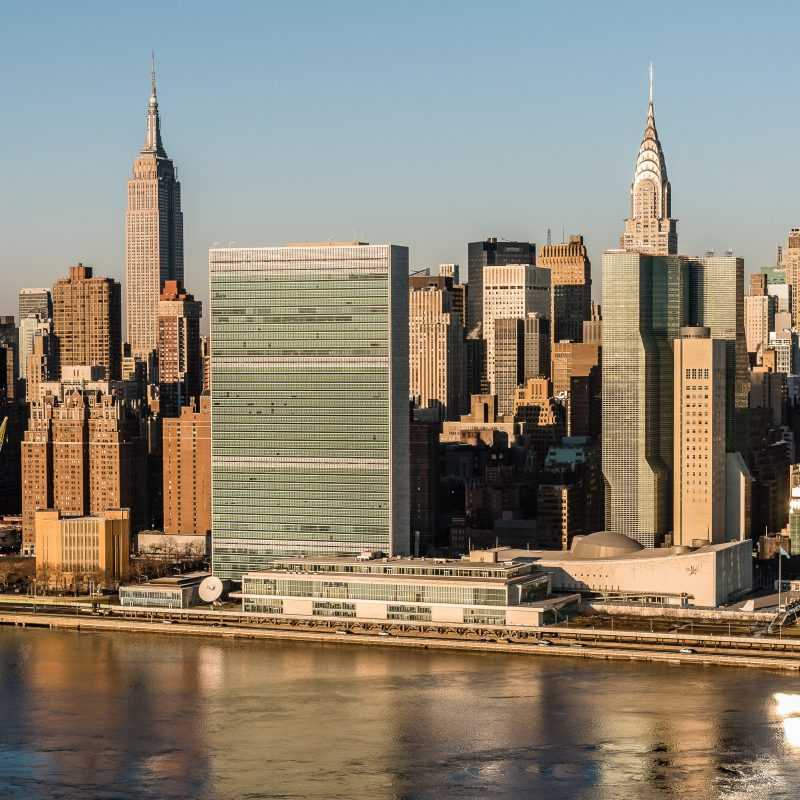
The Future Is Youth-Led: Our Reflection on the Summit of the Future Action Days
November 21, 2024
This year’s High-level segment of the United Nations General Assembly (UNGA) was centered around the Summit of the Future. The aim of the segment was to renew multilateralism and modernize the United Nations system to address the key global challenges, including sustainable development, finance for development, peace and security, youth empowerment and digital cooperation and governance. Leaders worked toward a more sustainable, equitable future by adopting the Pact for the Future, the Global Digital Compact and the Declaration for Future Generations.
Ahead of the official kickoff of the summit, an APCO delegation participated in the Summit of the Future Action Days, which took place on September 20 and 21 at the UN Headquarters, as well as during the formal proceeding of the Summit on September 22 and 23. The two action-packed days were filled with interesting dialogues on relevant topics such as artificial intelligence (AI) regulation, environmental sustainability, gender equality and human rights, just to name a few.
However, four things stood out to our team as conversations that should and will expand beyond this monumental time at the UN.
Former UN High Commissioner for Human Rights Mary Robinson quoted Martin Luther King Jr. multiple times to emphasize “the fierce urgency of now.” From government leaders to youth delegates, all participants agreed on the necessity of immediate action to address global issues. There is little time to wait.
However, the struggles to reach agreement on certain sections of the Pact of the Future, particularly in areas like global governance reform, highlight the challenges in securing bold, transformative changes. While ambitious changes are essential for progress, they are hard to achieve quickly. A solution to this is incremental change, which raised critical questions about identifying immediate opportunities for gradual improvement that align with our long-term objectives.
One of the most effective strategies identified for achieving significant incremental change is to translate global initiatives—those commitments outlined in international agreements—into tangible actions at the local level. This approach, which APCO refers to as “glocal,” has been demonstrated through various programs worldwide.
For instance, tax education workshops in Vietnam and risk foresight planning for communities in the Amazon have shown how these efforts can directly impact individuals’ lives. And while it’s recognized that participation is a collective responsibility, it’s noteworthy that young people are at the forefront of these initiatives that are actively transforming these global promises into concrete actions within their communities. This also requires aligning and increasing international funding to match the size of the challenges as big as climate change through innovative financing mechanism that leverage on private capital.
Young people have been a part of the multilateral space for many years, but it wasn’t until 2013 when the Office of the Secretary-General’s Envoy on Youth was established, and it took until 2022 for the UN to officially establish the UN Youth Office. Perhaps the UN finally realized that the people who will be most impacted by its decisions should be in the room to be part of those conversations.
This notion was in full effect at the Summit of the Future Action Days, where a young, energetic crowd filled every conference room, hallway and many of the speaking roles. It was refreshing to see so many young leaders bringing their perspectives to the table, and perhaps this is a tipping point for the UN—the energy and resilience of this generation might just be the key to revitalizing multilateralism.
APCO is committed to see this focus on youth replicated across global forums and multilateral organizations. After all, our generation will inherit this earth, so we might as well have a seat at the table to ensure there is an earth to inherit in the first place.
Unsurprisingly, AI and emerging technologies had a heavy presence in many of the conversations taking place across these two days. However, the emphasis this time around was on ensuring everyone has access to skilling opportunities that will enable them to make the most out of AI and the AI economy. Of note, the concept of leaving no one behind in this digital revolution was very present, with a clear understanding of the need for skilling and access efforts in the Global South, addressing the challenges of technology and the role of the private sector and governments in facilitating said access.
While it is undeniable that the UN has had some achievements in terms of preserving world peace, the summit was clouded by the ongoing conflicts in Ukraine, Gaza and many other parts of the world that keep increasing the number of military and civilian casualties. In this difficult context, the Global South increased the cry for an urgent reform of the security council. In the words of the UN secretary general, “we cannot solve 21st century problems with 20th century tools.” A plea that had a great echo across stakeholders.
As we continue these conversations beyond the high-level week of the UN General Assembly and move into the implementation of the myriads of actions that were agreed upon in the Pact for the Future, APCO’s team remains committed to continuing this conversation and offering viable solution, particularly through the enhanced action of the private sector.